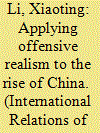|
|
|
Sort Order |
|
|
|
Items / Page
|
|
|
|
|
|
|
| Srl | Item |
| 1 |
ID:
145769


|
|
|
|
|
| Summary/Abstract |
This study employs offensive realism to provide a baseline for assessing Beijing's strategic choices in dealing with regional neighbors. In theory, when an ascending power is not yet capable of dominating its home region, it would strive foremost to prevent external powers from extending their influence in its vicinity. To attain that goal, it will likely adopt a carrots-and-sticks strategy, by rewarding some neighbors and punishing others according to their readiness to accommodate its ascendance and keep a cautious distance from external powers. Empirically, China's management of territorial disputes from the 1950s onward is quite consistent with these theoretical expectations. Viewed in this light, restraint and assertiveness are not inversely related in Chinese foreign policy behavior. Rather, they are two sides of the same coin and serve the same overriding purpose of countering adversarial (especially US) influences in China's neighborhood.
|
|
|
|
|
|
|
|
|
|
|
|
|
|
|
|
| 2 |
ID:
154822


|
|
|
|
|
| Summary/Abstract |
This article considers why cronyism and military corruption remained rampant in the post-Deng Xiaoping era, despite the PLA’s progress toward modernization and professionalization. In theory, the bifurcation of civilian and military elites and the demise of ‘supreme leaders’ provide the PLA with greater autonomy vis-à-vis the Party, whereas the persistence of personalistic power in decision-making creates opportunities for upper-level leaders to place trusted associates in key posts. The lack of effective checks and balances thus facilitates the misuse of power for private ends and gives rise to cronyism and corruption. Relatedly, the Party’s command of the gun is at risk if and when the promotion of military officers conforms more to the exercise of personalistic power than to the prescribed procedures of Party control. Moreover, several major cases of military corruption reveal that the weakening of Party oversight may be a remedy worse than the disease.
|
|
|
|
|
|
|
|
|
|
|
|
|
|
|
|
| 3 |
ID:
124609


|
|
|
|
|
| Publication |
2013.
|
| Summary/Abstract |
For a long time, the People's Republic of China was known to be prone to use military force to settle foreign policy crises or interstate disputes. Extending Alexander Wendt's analysis of different cultures of anarchy, I argue that Beijing's famed violence proneness-that is, its propensity to use force-was historically a product of the militarized or Hobbesian worldview held by China's leaders during Mao's reign, when the PRC acted as a revolutionary challenger against the international system. Since Mao's death, however, China has been increasingly integrated into the system and, consequently, has experienced a Lockean turn in its worldview, which softens its predilection for violence. A systematic, quantitative test of my theory provides strong evidence that the evolution of China's militarized worldview, rather than its expanding relative power, played a key role in driving Beijing's resort to force between 1949 and 2001.
|
|
|
|
|
|
|
|
|
|
|
|
|
|
|
|
|
|
|
|
|